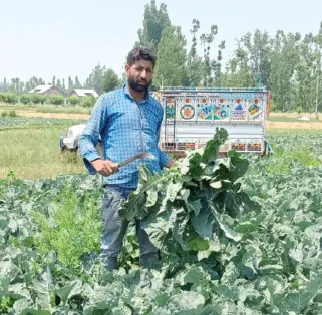Located some 12 kms from south Kashmir’s Pulwama town, the sleepy village of Bangund, long known for its large swaths of agriculture farms, is stirring awake to a green revolution. This pastoral hamlet has embarked on an inspiring journey towards organic farming, driven by a growing commitment to sustainable practices and a renewed appreciation for the bounties of nature.
The transition to organic farming in Bangund started in 2017 when a group of forward-thinking farmers received guidance from the officials of the Department of Agriculture. Soon, the entire village embraced chemical-free farming, setting off a remarkable transformation that has captured the attention of agricultural enthusiasts far and wide.
“It started in 2017 with the visit of some agriculture officials who not only encouraged us to practice organic farming but also made us acquainted with the detrimental effects of chemical fertilizers,” said Javed Ahmad Bhat, a farmer who cultivates different varieties of vegetables across his 40-kanal farm.
According to Bhat, the department provided the farmers with agri-tools and equipment at subsidised prices, easing their farming practices.
“We have also imparted training in preparing the vermicompost for our farms,” said Bhat.
In the village, around 100 households are cultivating different vegetables using organic methods. “More than 400 kanals of land in our village are under organic cultivation, producing nearly 5000 quintals of vegetables annually,” said Bhat,
Nazir Ahmad, another farmer from the village said that almost the entire village relies on vegetables for their livelihood.
“Our annual turnout is between Rs 20 to Rs 25 lakh,” he said.
The vast farmlands in the village are dotted with small vermicompost trenches, which have been constructed by the farmers with the financial assistance of the Department of Agriculture.
With all the cultivators embracing the commitment of eschewing the use of chemical fertilizers, the village was declared the first organic vegetable-producing village in Kashmir in 2018.
Since 2015-16, the government has been actively promoting organic farming as a chemical-free approach through schemes like the Paramparagat Krishi Vikas Yojana (PKVY) and the Mission Organic Value Chain Development for North Eastern Region (MOVCDNER).
In 2020-21, the Bhartiya Prakritik Krishi Padhati (BPKP) was introduced as a sub-scheme of the Paramparagat Krishi Vikas Yojana (PKVY). The initiative aims to promote traditional indigenous practices including Natural Farming.
In 2023, the Jammu and Kashmir government also kept a budget of Rs 84 crore as part of its program to promote sustainable agriculture in the region. The initiative forms a crucial component of the government’s comprehensive strategy to foster sustainable agriculture, encourage commercial farming practices and ensure the production of nutritional food.
The program’s goals include the generation of over 12, 600 employment opportunities and the establishment of 300 enterprises within the organic agriculture sector, thereby contributing significantly to economic growth and job creation while promoting environmentally friendly farming practices.
However, the farmers of the village said that the government failed them to facilitate the sale of their produce.
“We sell our produce in an open market or mandis where consumers often overlook whether the vegetables are chemical free or not”, said a group of farmers from the village. They said that the government should establish a dedicated market both in and outside Kashmir where they could sell their produce at better prices.
“The government should even launch an online marketplace for the sale of organic vegetables,” said the farmers.







